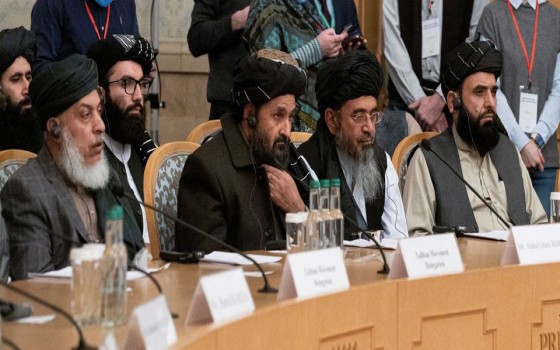
The Taliban celebrates one year since its return to power

- Europe and Arabs
- Monday , 15 August 2022 13:25 PM GMT
AFP
The Taliban declared Monday a public holiday to mark the one-year anniversary of their return to power in Afghanistan, a year that has seen a major humanitarian crisis and a sharp decline in women's rights. On August 15, 2021, the Taliban took control of the capital, Kabul, without facing any resistance, after a lightning attack on government forces across the country, in light of the hasty withdrawal of US and NATO forces after twenty years of military presence in Afghanistan. "We fulfilled the duty of jihad and liberated our country," said Nimatullah Hikmat, a Taliban fighter who entered Kabul that day, a few hours after President Ashraf Ghani fled the country. The chaotic withdrawal of foreign forces continued until August 31, as tens of thousands of civilians frantically rushed to the capital's only airport, seeking to depart on any available plane. And the world discovered in astonishment the scenes of crowds rushing to planes parked on the runway, climbing on them, or clinging to a US military cargo plane during takeoff. With the exception of Monday, which was declared a holiday, no official celebration has been announced so far, but state television indicated that it would broadcast special programs, without further details. A year on, Taliban fighters are glad to see their movement in power, while humanitarian agencies warn of extreme poverty affecting half of the country's 38 million people. "When we entered Kabul, and when the Americans left, those were moments of joy," added Nematullah Hikmat, who is today a member of the Special Forces in charge of guarding the presidential palace. But for ordinary Afghans, especially women, the return of the Taliban has only added to the hardship. Despite their initial promises, the country's new rulers quickly re-imposed their strict interpretation of Islamic law that marked their previous rule between 1996 and 2001 and severely restricted women's rights. - 'Everything was taken away from us' - Women were largely excluded from government jobs and were prohibited from traveling alone outside the cities in which they lived. And in March, the Taliban banned girls from enrolling in middle and high schools just hours after they reopened under a long-publicized decision. In early May, the Taliban's supreme leader, Hebatullah Akhundzada, ordered women to wear the niqab in public. The Taliban have made clear that they prefer women to wear the burqa, but will tolerate other forms of veiling that expose only the eyes. "From the day they arrived, life lost its meaning," says Ugai Amail, a Kabul resident. "Everything was taken away from us, they even entered our personal space." On Saturday, Taliban gunmen with rifle butts and live bullets dispersed a demonstration organized by about forty women to demand the right to work and education. Although Afghans acknowledge the decline in violence with the end of the war since the Taliban came to power, many of them are suffering severely as a result of a severe economic and humanitarian crisis. "People who come to our stores complain so much about the high prices that we shopkeepers start to hate what we are doing," said Noor Muhammad, a shopkeeper from Kandahar, the Taliban's historic cradle and power center in the south of the country. But for the Islamist fighters, the joy of victory overshadows the current economic crisis. "We may be poor, we may be facing difficulties, but the white flag of Islam will forever fly high in Afghanistan," says one of these fighters












No Comments Found